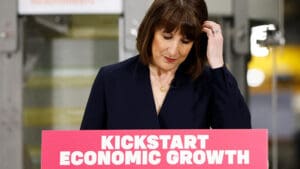The head of one of Britain’s best-known law firms has warned that Rachel Reeves’s reported plan to raise taxes on limited liability partnerships (LLPs) could drive professionals and entrepreneurs out of the UK, undermining London’s status as a global business hub.
James Libson, managing partner of Mishcon de Reya, said proposals to align LLP taxation more closely with standard employment rules risked punishing professionals who take on business risk and contribute significantly to the economy.
“Most people using LLPs are middle-class, upper middle-income people,” Libson said. “It means the attractiveness of living here is diminished. I’m not talking about the millionaires or billionaires — normal people will look for opportunities to work elsewhere.”
The Chancellor is said to be considering measures that would raise the overall tax burden on partnerships, following reports that senior Treasury officials believe the reforms could raise up to £1.9 billion by bringing LLPs in line with employer National Insurance contributions.
However, Libson described the potential changes as “dangerous and potentially destructive”, warning that they would worsen Britain’s brain drain just as rival financial and legal centres were growing more competitive.
“To equate partners and investors who operate through LLP structures as employees is to sell the proposition in completely the wrong way,” he said. “The reason the system works is because these are people investing in their business — they take risk, they put in capital.”
The Treasury has declined to confirm or deny that LLPs are being targeted in the November 26 Budget, though sources told the Financial Times that any increases would be “less severe” than first feared and may include exemptions for partners earning below a certain threshold.
The LLP structure, introduced in 2001, allows professionals to operate as partners rather than employees, offering both flexibility and tax efficiency. According to Companies House, there are now more than 50,000 LLPs across the UK, spanning law, accountancy, architecture, consultancy, and other professional services.
Critics argue that the system gives high earners an unfair advantage, but supporters say it underpins one of Britain’s most globally competitive sectors. A London School of Economics report found that the top 0.1% of taxpayers earned nearly half of all partnership income in 2020.
Libson insists the perception of LLPs as tax shelters for the ultra-wealthy is misleading. “These are not hedge fund billionaires,” he said. “They’re professionals building practices, employing hundreds of people, and keeping Britain competitive in legal and advisory services.”
Mishcon de Reya — founded in 1937 and known for representing Princess Diana in her divorce from the then Prince of Wales — reported £332 million in turnover and £111 million in pre-tax profits last year. The firm now employs more than 1,400 people, including 650 lawyers.
Reflecting a wider trend among professional service firms, Mishcon recently opened offices in Dubai and Abu Dhabi, joining rivals Addleshaw Goddard and Simmons & Simmons in expanding into the Gulf region, where lighter regulation and tax advantages are attracting international talent.
“With the strategies we are pursuing — private wealth, innovation, disputes — [the UAE] is an absolute hub,” Libson said. “More and more we’ve felt that London’s magnetism has diminished, while other centres of gravity are growing around the world.”
Libson said Mishcon’s immigration practice had seen a marked increase in professionals relocating to the Middle East — a reflection, he argued, of growing frustration with the UK’s tax and regulatory environment.
“From our own internal barometer, we’ve seen very significant traffic to the Gulf,” he said.
The warning comes as economists estimate that Britain’s top 1% of earners now contribute more than 30% of all income tax receipts, making their mobility a key fiscal risk.
Libson added that, while the government’s industrial strategy rightly highlighted professional services as a growth priority, policies targeting partnerships would send the opposite message.
“London is still the greatest city in the world — but the issue, as always, is execution, productivity and cutting through the bureaucracy that holds us back,” he said. “Other countries are doing that really well.”
Mishcon de Reya’s board recently appointed Dame Alison Rose, former NatWest chief executive, as non-executive chair, building on her advisory work in diversity and inclusion. Libson praised her appointment as a signal of the firm’s long-term vision.
“Alison is one of the most impressive people I’ve ever worked with,” he said. “Our diversity push has never been tokenism — it’s about creating an environment where people want to work. It’s a business decision as much as anything else.”
With the Budget just weeks away, City leaders remain anxious over the scale of Reeves’s planned tax rises. For firms like Mishcon de Reya, the outcome could determine whether London remains the beating heart of global professional services — or whether, as Libson warns, “normal people” begin to follow their wealthier clients abroad.

















